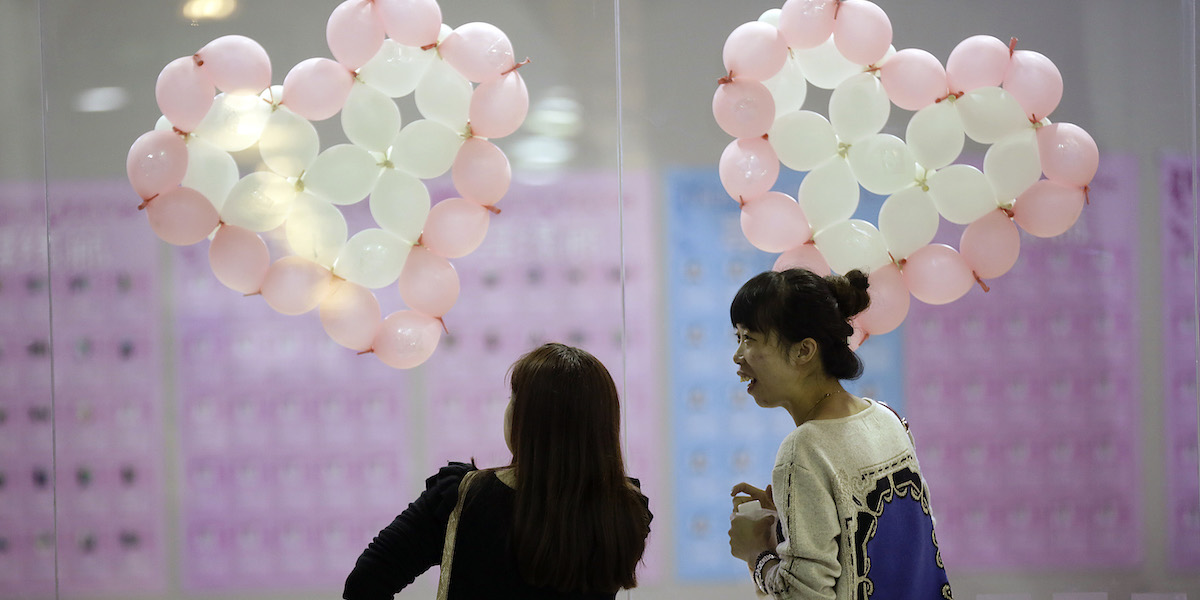Loading player
In South Korea, cities are increasingly funding and organizing public “blind dates,” events that serve to introduce single people in the area to each other. The goal is to encourage the formation of new couples and thus counteract the decline in marriages and births. In South Korea it was indeed registered for the third year in a row the lowest fertility rate in the world and the organization of blind dates for singles is the latest in a series of measures that the central government and local governments have taken to try to solve at least partially the problem.
The events organized in various South Korean cities are very similar to each other. They are held in spaces large enough to contain dozens of people, such as hotel rooms, and tend to be in suggestive and pleasant locations, for example in scenic mountain resorts. Spaces are often decorated with pink balloons and festoons with writings that refer to love. Even the background music is chosen to create an intimate and romantic atmosphere.
Last month in Seongnam, a city in South Korea on the outskirts of Seoul, an event of this type was organized in the hall of the Militopia Hotel, a large hotel in a city park: 50 men and 50 women who did not they knew each other, all between the ages of 26 and 38 and all residents of Seongnam or employees of local companies. To participate, it was necessary to send a civil status certificate attesting to one’s status as an unmarried person.
In the hall there were pink balloons, decorations and tables set for small groups. Participants were seated at the tables and invited to participate in the activities scheduled for the evening, all designed to facilitate conversation and mutual understanding: for example, personality tests, with which those present had to ask questions and talk about themselves. The mayor, Shin Sang-jin, also spoke during the evening: according to the newspaper Korea Herald, at the end of the event, 15 pairs of people interested in getting to know each other better had formed. The title of the event was Solomona play on words between “only”, single, and Solomon, a biblical figure known for his wisdom.
South Korea is not the only Asian country where similar events are organized and financed: some municipalities in China have also organized them, again to try to counter the decline in marriages and births. In China, some cities have also created apps that suggest possible meetings based on the information that the local administration has about its unmarried citizens.
In South Korea, blind dates for single people have become increasingly frequent in the most aging cities. The Korean government has classified 89 counties and cities as “population declining areas” and earmarked the equivalent of over 600 million euros per year for the organization of this type of event. In Seongnam alone, a city of around one million people, the equivalent of over 170,000 euros has been allocated to public blind dates.
Over the years, the Korean government has tried to adopt various measures to encourage marriages and births. Among other things, economic incentives have been promised but have not achieved the desired effect. Even public blind dates, despite high participation in some areas of the country, do not seem to have achieved the expected results. However, the available data is fragmented and partly incomplete: in Jinju, a city in the south-east that has been organizing these events for many years, it appears that 11 couples have formed in 12 years; in Gumi, an industrial city in the center of the country, there have been 13 weddings since 2016. In both cities, local authorities told the New York Times I don’t know how many children these couples have had.
– Read also: The Chinese city that created a dating app to encourage marriages
